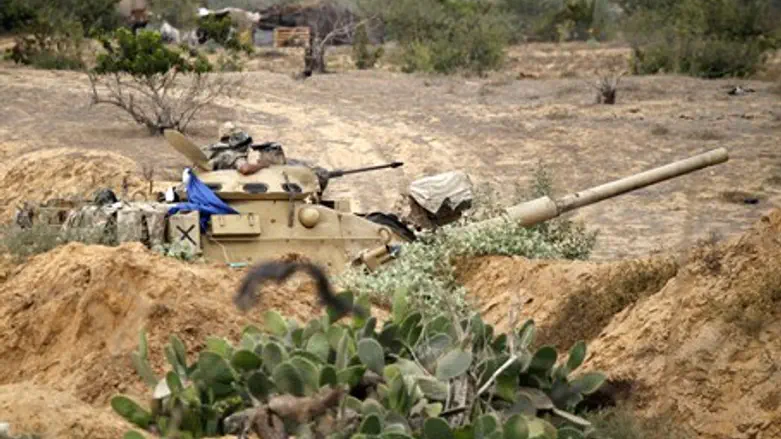
U.S. lawmakers on Tuesday urged the White House to lift its suspension of military aid to Egypt, AFP reports.
The lawmakers warned that freezing funds and weapons deliveries might unravel decades of cooperation with a key regional ally.
Democratic Representative Eliot Engel, a member of the House Foreign Affairs Committee, said he had initially supported a temporary halt to deliveries of F-16 aircraft to the Egyptian military following its ouster of President Mohammed Morsi in July.
“But today I do not believe that suspending the military aid will make the Egyptian government more democratic or make it easier for the United States to influence its behavior in the future,” he told the committee, according to AFP.
“In fact, I think it’s more than likely to have the opposite effect. And I’m afraid it could jeopardize the close U.S.-Egypt military cooperation that we’ve worked so hard to build over the last several decades,” he added.
The United States announced earlier this month that it would withdraw a significant portion of its military aid to Egypt. The U.S. provides $1.5 billion in annual aid to Egypt, but no dollar amount of the aid being cut was provided.
The military aid includes Apache helicopters, F-16 fighter jets, M1A1 Abrams tank parts and Harpoon missiles.
The decision came after months of debate since Morsi was deposed in early July. U.S. law forbids sending aid to countries where a democratic government was deposed by a military coup, but the U.S. has never qualified Morsi’s ouster as a "coup" and has been cautious about doing so.
The harsh government crackdown on pro-Morsi protestors was seen by the U.S. as a step too far by the interim government.
More than 1,000 people, mainly Morsi supporters, have been killed since July 3 and authorities have rounded up some 2,000 Islamists, including most of the Muslim Brotherhood’s leadership.
Engel condemned the violence and agreed that “it’s clear that the Egyptian military has made some serious mistakes in managing the ongoing transition.”
“But if I were given the choice between the military and the Brotherhood, I’d take the military every time,” he noted.
Committee chairman Ed Royce worried about harming security operations on the Sinai Peninsula, and exposing other regional allies to greater insecurity.
“I would just urge the administration to reconsider its decision to withhold the sale of weapons systems that are going to be increasingly important to Egypt’s ability to confront terrorist organizations,” he said, according to AFP.
Republican Dana Rohrabacher went further, accusing the Obama administration of abandoning interim military chief Abdel Fattah al-Sisi despite being “grateful to him for stepping in to prevent this radical Islamic shift that would have destabilized the region.”
“We’re hanging General al-Sisi and the people that we’re applauding for defeating radical Islam in Egypt, we’re leaving them hanging out to dry,” Rohrabacher said.
Acting Assistant Secretary for the region, Beth Jones, told lawmakers that the U.S. was continuing to supply spare parts so the Egyptian military could continue to operate its already formidable arsenal.
“This recalibration reflects our effort to advance U.S. core interests in Egypt and the region while impressing upon the Egyptian leadership the importance of making progress toward a democratic transition,” Jones insisted.
Derek Challot, assistant defense secretary for international security affairs, stressed assistance for security in the Sinai as well as counterterrorism efforts would continue.
He hinted, however, that while delivery of large systems could be resumed, the nature of U.S. aid might change as it works with Egypt “to determine whether to sustain certain legacy systems that might otherwise be retired.”
“We want to continue a strong military-to-military relationship that preserves our strategic interests. And we want Egypt to develop a military that is prepared to meet the threats of the 21st century,” Challot said.
He insisted that the systems withheld from the Egyptian military were “not affecting their operational effectiveness in the Sinai at all.”
The Egyptian armed forces have launched large scale military operations against terrorists in Sinai in an attempt to suppress the insurgency, which has been going on for years but has gotten worse since Morsi’s removal.
Egypt’s Foreign Minister Nabil Fahmy recently said that the U.S. would be hurting itself if it cut off aid to Egypt.
“If your friends in the region, when they’re facing terrorism in particular, cannot depend on a continuous supply of equipment that deals with terrorism, then you are obviously going to raise questions in the mind of those friends about your dependability,” he said, referring to the United States.
“And that will affect your interests as well as those of your friends, like Egypt,” Fahmy added.
